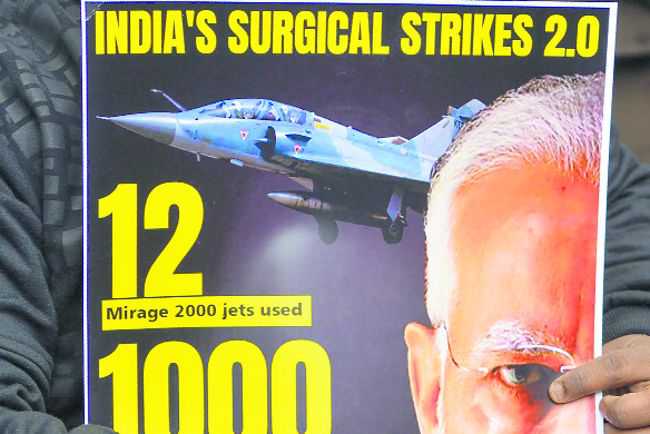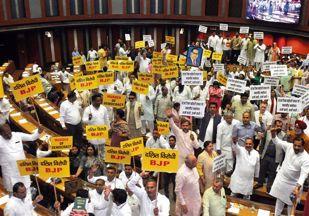
Action man: The strike will be used to burnish Modi’s credentials as a decisive leader.
Vivek Katju
Ex-Secretary, Ministry of External Affairs
Till the strike against Jaish-e-Mohammed’s (JeM) ‘massive training facility’at Balakot, the post-Pulwama internal political and external diplomatic landscape had striking similarities to the situation that was prevalent after earlier attacks from Pakistan-based terrorist groups. This action may, however, bring about a radical departure and set a new standard of public expectation in the way India deals with beyond-the-acceptable terrorist attacks from Pakistani soil. It would be futile, though, to expect that this correct and justified action will end Pakistani terrorism. That would require sustained, comprehensive efforts and a firm and continuing exercise of national will.
PM Modi has clearly and laudably resisted the temptation, in the immediate aftermath of the Balakot strike, to exult to take political advantage. While that will, undoubtedly, come during the campaign, his first objective now was to provide Pakistan an escape route from undertaking a kinetic response. Hence, only the Foreign Secretary was deployed to issue a measured and restrained statement informing India and the international community about the ‘non-military preemptive action’ against the JeM camp. Through this somewhat confusing formulation, India sought to emphasise that it had undertaken a counter-terrorist strike based on intelligence reports that the group was planning to launch a major terrorist strike in India. The Foreign Secretary refrained from giving any details of the nature of the Indian action, except to note that it was against a training facility that was led by Masood Azhar’s brother-in-law, Yusuf Azhar, also known as Ustad Ghauri.
The government has clearly thrown the ball in Pakistan’s court. While Imran Khan had publicly threatened India to expect immediate retaliation and Maj Gen Asif Ghafoor, Director-General of Pakistan’s Inter Services Public Relations (ISPR), had reiterated the warning, Rawalpindi’s first reaction was designed to give it space to avoid an immediate armed retaliatory step. Ghafoor tweeted that Indian aircraft had crossed the LoC. They were chased out by the Pakistan air force and were compelled to drop their payload in uninhabited areas, thereby causing no damage either to human life or property. This tweet would assuage the Pakistani public’s prickly self-esteem and notions of izzat but just about if the news of what actually happened gets known.
It is true that the Indian media has carried reports based on leaks and perhaps behind-the-scenes briefings of the Indian strike. In the absence, though, of any official Indian word to challenge Ghafoor’s comments, India has signalled both to Pakistan and the international community that it does not wish that matters escalate. The fact that Modi did not refer to the Balakot action in his speech immediately after the CCS meeting yesterday and Sushma Swaraj and not Modi (as per reports) called an all-party meeting also indicate that India does not wish to put Pakistan in a further spot.
There is little doubt that the US, already engaged with India and Pakistan in what was according to President Trump a very dangerous situation would not want a distraction as President Trump meets North Korea’s Kim Jong-un in Vietnam and as the US-Taliban talks proceed in Qatar. Thus, it can be expected to press Pakistan to proceed to use diplomatic levers and not kinetic power. Following Ghafoor’s tweet, Pakistan deployed not PM Imran Khan, but Foreign Minister Shah Mehmood Qureshi to announce that the LoC was violated and his country had the right to give a suitable response in self-defence. This, too, indicates that for the time being, Pakistan is not wishing to up the ante. All this is logical, but history shows that Pakistani generals do not always behave rationally in their dealings with India. Hence, they may react by sponsoring some action, including by terrorists, to seek to embarrass Modi during the forthcoming election process, even if they now hold their hand.
The response of the other major powers to Pulwama had been entirely predictable till the Balakot action. Thus, there was swift condemnation and expressions of sympathy. Going further, the UNSC, after days of discussion, issued, for the first time, a statement condemning the attack. China was persuaded to accept the formulation that the JeM had acknowledged it and departing from the traditional UN phraseology that it had taken place in J&K as distinct from ‘Indian-administered Kashmir’. These powers, except China, can be expected now to counsel restraint to both countries and stress the need to control terrorist groups. The Chinese will, no doubt, find some way of showing solidarity with their all-weather friend.
The Balakot action will be used by the BJP to burnish Modi’s credentials as a decisive leader who has dealt firmly with national security. The immediate response of the Opposition has been to laud the Air Force, but soon enough, it will seek to challenge Modi on this issue. Congress spokespersons have been raising questions about intelligence lapses, about Modi’s insensitivity in the immediate hours after the attack and the ‘failures’ of his Pakistan and Kashmir policies. They were also demanding that he should act as decisively as Indira Gandhi had done in 1971 and achieve the same results. The inherent taunt in these comments was not difficult to discern. Will all this play with the electorate remains to be seen. Prima facie, it looks doubtful.
The real significance of the Balakot action lies in the damage it will do to Pakistan’s nuclear overhang doctrine. It had sought to paralyse India against deploying its conventional defence assets after a terrorist attack. India has shown that it has given space to its armed forces for specific punitive measures. While Pakistan strategists will factor this in, they are unlikely to easily abandon the use of terror.



























